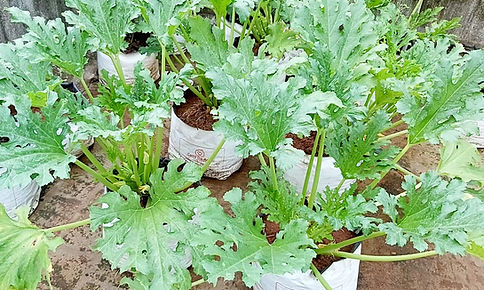
How to Grow Zucchini at Home - Home Gardening
How to plant Zucchini
-
Zucchini plants can be grown from young plants or seeds. When starting with seeds, they should be sown directly in the garden or in the grow bags.
-
They can also be planted together in a single container and can be transplanted to individual grow bags
-
Optimal soil temperature for germination of the seeds is 25-35°C
-
When the soil has warmed up in your grow bag, plant seeds one-half inch deep, 3 to 4 inches apart, in rows that are 2 to 3 feet apart.
-
Seeds should sprout in 7-14 days after planting them.
-
Thin plants so that they are spaced 6 to 8 inches apart once they are 4 to 5 inches tall.
-
After seedlings are grown a few inches height, Thin to one plant per spot once the seeds have sprouted and have grown their first set of true leaves.
-
Once seedlings are established, create a mulch around the plants to keep the ground temperature stable and also helps the soil retain water
Irrigating and Fertilizing Zucchini:
-
Zucchini needs plenty of moisture and lots of organic fertilizer for proper growth.
-
Grow them in rich, well-drained soil in full sun.
-
Zucchini plants need regular feeding in addition to being planted in the rich, nutritious soil mentioned earlier
-
Remove the top soil around the Zucchini plants and apply finished compost or well-rotted manure or 1 cup of complete organic fertilizer beneath each plants and cover them with the same layer of soil.
-
Liquid fertilizer like Fish Emulsion can also be applied to the plants to increase the immunity and promote plant growth.
-
Water the soil around them regularly in the mornings and always avoid overhead watering to prevent attract diseases like mildew.
-
Install a drip irrigation at the time of planting to keep th soil most all the time.
How to care for Zucchini plants
-
Zucchini plants are vulnerable to a number of pests like squash bugs, fruit borers, cucumber beetles and powdery mildew
-
Biggest problems for Zucchini is because of fruit borer. Fruit borer larvae feed inside the main stem of the plant, hollowing it out and cause plant death.
-
To prevent fruit borers affecting zucchini, lower portion of the stem should be wrapped with aluminum foil to keep the female moths away from egg-laying sites.
-
Zucchini plants are prone to be attacked by fungal diseases like Powdery mildew.
-
Symptoms are the leaves appear to be covered in a powder-like coating and this lead to reduced photosynthesis and reduced production.
-
To overcome powdery mildew, neem based liquid pesticide can be sprayed along with soap liquid on regular intervals.
-
Zucchini are heavy feeders. Feed the zucchini plants with 250 grams of organic matter after 30 days of planting.
-
While fertilizing the zucchini, remove the top soil and side-dress zucchini with cattle compost and cover this soil.
-
Foliar spray of liquid fish or bio fertilizer with high in phosphorus can be applied for fruit production.
Harvesting Zucchini:
-
Zucchini can be harvested at the moment they reach a usable size about 6 to 8 inches in length
-
Generally zucchini is harvested when its tender and they have good flavor when they are young. Also smaller fruits have superior taste
-
Zucchini can grow 1 to 2 inches a day
-
Zucchini that grows very large will be pulpy, seedy, and bitter flavored.
-
Carefully cut fruits off the plant with a knife or pruners when zucchini are between 3 and 8 inches long. Leave about two inches of the stem to remain on the fruit.
-
To help them store longer, harvest with at least an inch of stem still attached.
-
If grown correctly and healthily, you should be able to harvest zucchini multiple times in one growing season.












